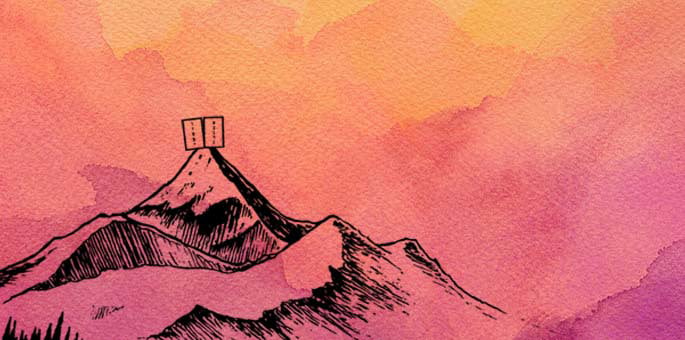In the Hebrew year 24481 (1313 BCE), on the 6th (or 7th—see The Events section) day of the Hebrew month of Sivan, G‑d gave us the Ten Commandments2 and, at least in a general sense,3 the entire Torah (the Pentateuch and the 613 laws contained therein). This was no simple handing over of a book of lore; G‑d gave us His Divine laws for us to study and follow. This was a transitional moment in our history—a moment known as Matan Torah (the Giving of the Torah.) No longer were we merely the descendants of a great man named Abraham, or simply a Middle-Eastern people known as the Israelites. We had now become G‑d’s people, chosen to learn His Torah and keep its laws. It’s a moment we celebrate every year on the festival of Shavuot.
Let’s paint a detailed description of the events surrounding this momentous occasion.
The Events
With the Exodus from Egypt only three months in the past, the Jews arrive at Mount Sinai to hear the Ten Commandments and receive the Torah. Here’s a summary of the events leading up to Matan Torah:4
- Sivan 1 (Rosh Chodesh): The Jews reach Sinai and camp at the foot of the mountain.
- Sivan 2: G‑d tells Moses that He not only wants to give the Jews the Torah, but also wants to make them His chosen, holy nation, who will follow His commandments. The Jews wholeheartedly agree, replying, “All G‑d wishes we will do.”
- Sivan 3: Moses relays the Jews’ answer to G‑d. Moses then returns to the Jews to tell them that he will be the messenger for the Ten Commandments; G‑d will speak them to him, and he will in turn tell the Ten Commandments to the Israelites. They reply by saying they want to hear from G‑d directly.
- Sivan 4: Moses relays the Jews’ request to G‑d, and G‑d agrees. Moses tells the Jews to prepare for Matan Torah. (There’s a disagreement among the sages whether he told them to prepare for two or three days, the practical difference being whether Matan Torah was on Sivan 6 or 7.)
- Sivan 6 or 7: The big moment—Matan Torah.
The Jews awake to thunder and lightning and a deep, powerful horn blast. As they approach Mount Sinai, they see it ablaze, a thick cloud at its peak. Trembling in awe and fear, they gather at the foot of the mountain as Moses ascends alone to the top.
Against this incredible backdrop, G‑d speaks the first two of the Ten Commandments. With each one, the entire Jewish people die from the intensity of the Divine voice. G‑d subsequently brings them back to life.5 After the first two commandments, the people decide that it’s too much for them, and they ask Moses to transmit the remaining eight commandments. (Don’t worry, the remaining commandments are not considered to be lacking in any way. Moses was so in sync with G‑d’s will that he was considered to be G‑d’s vessel; G‑d “spoke through his throat.”6 )
See here for a comprehensive overview of the story.
What Was Given and How
Though the name of the event—the Giving of the Torah—implies that the entire Torah was given that day, this is not the case. In fact, only the Ten Commandments were taught to us that day, and even they were only transmitted verbally. The physical luchot—the tablets—were not given for another 40 days.
Nevertheless, the name remains, as it marks the day G‑d began the process of giving us the Torah. First we were taught the Ten Commandments. Then, Moses stayed on Mount Sinai for 40 days learning with G‑d. During that time, G‑d taught Moses all the rules of how to interpret and understand the Torah.7 The Talmud even says that Moses learned every single future interpretation of Torah that would ever exist.8 Though it is clearly impossible for him to have learned them all, he did learn the rules they are based on, and so it is considered as if he actually learned them.9 The rest of the Torah was was communicated in stages throughout the Jews’ 40-year sojourn in the desert.10
The Ten Commandments
- Believe in G‑d.
- Do not believe in other deities.
- Do not take G‑d’s name in vain.
- Keep Shabbat.
- Honor your parents.
- Don’t murder.
- Don’t commit adultery.
- Don’t kidnap.
- Don’t give false testimony.
- Don’t covet another’s possessions.11
What Makes This Day So Important
Although Matan Torah is known as the time when G‑d gave us His Torah to study and keep, there were a few Israelites who had kept the entire Torah of their own volition before Matan Torah. This raises the question: what makes this day so important? True, only a select few had been keeping the Torah, and after Matan Torah we were all expected to keep it, but this seems to be merely a quantitative difference. The hype over Matan Torah makes you think that something unique was given to us that day, something that we simply did not have before. What was that?
Two things changed that day. The first was our connection to G‑d. Before Matan Torah, those who observed Torah did so entirely of their own accord. Their connection to G‑d, therefore, was only as deep as their understanding and feeling. At Matan Torah, however, G‑d connected His Essence to the Torah and gave it to us.12 When we observe the Torah, therefore, we are connected to G‑d’s essence, no matter who we are and how much we understand or feel.13
Secondly, the effect Torah has on the world was permanently changed. Before Matan Torah, Torah and mitzvahs were considered spiritual matters, and were incapable of affecting the physical world. At Matan Torah, however, G‑d forever changed matters: Torah and mitzvahs could now affect the world. For example, post-Matan Torah, one can take the hide of a cow and turn it into tefillin, and those tefillin will now be holy.14
It is for these two reasons that Maimonides states that when we do mitzvahs now, we do them because G‑d commanded us to at Sinai, not because our forefathers did them.15
See here, here and here for a detailed analysis of this topic.
Other Noteworthy Occurrences
The Miracle of Thunder and Lightning: There’s an argument in Midrash16 about whether the Jews saw thunder and heard lightning or whether they saw lightning and heard thunder. Though the first opinion seems to be a fascinating but ultimately pointless miracle, and the other a completely natural occurrence, both opinions have a deeper meaning. Seeing something creates a profound connection that resonates in us with deep certainty, while hearing is more vague, less certain. Our connection to the physical can be equated to sight—deep and certain—while we can only hear and infer spiritual matters. However, the opinion that we saw the thunder maintains that the incredible spiritual revelations at Matan Torah caused us to connect more deeply with the spiritual—with what is usually only heard—than with the physical. The other opinion is that we kept our focus on the physical—we saw what is usually seen. Recognizing the Divine potential in the physical, we did not let the spiritual revelations sway us from our purpose in this world.17
See here for a detailed explanation of the miracle of thunder and lightning.
No Echo: G‑d’s voice had no echo.18 This was because the Torah permeated the entire earth to the extent that there was no barrier to G‑d’s voice; there was nothing for it to bounce off of and create an echo.
Seventy Tongues: G‑d’s voice translated into all the 70 languages of that era. 19 Besides the obvious importance of this miracle—that all the people of the world could hear what was happening—it also has a deeper meaning. One could think that not all the 613 mitzvahs are as special as the Ten Commandments. G‑d’s voice therefore split into 70 languages, to signify that even the 7 Noahide Laws—laws for the Gentiles who speak the 70 languages—are as much a part of Torah as the Ten Commandments.
See here for a detailed explanation on the miracle of the lack of echo and the 70 languages.
A Mountain Over Us: G‑d held a mountain over the Israelites and forced us to accept the Torah.20 This symbolizes the profound love we felt towards G‑d that day. We were so affected by all we witnessed that there was no way we could ever have said no to the Torah. G‑d may as well have held a mountain over our heads.
See here for a detailed explanation on G‑d holding a mountain over the Jews’ heads.







Join the Discussion